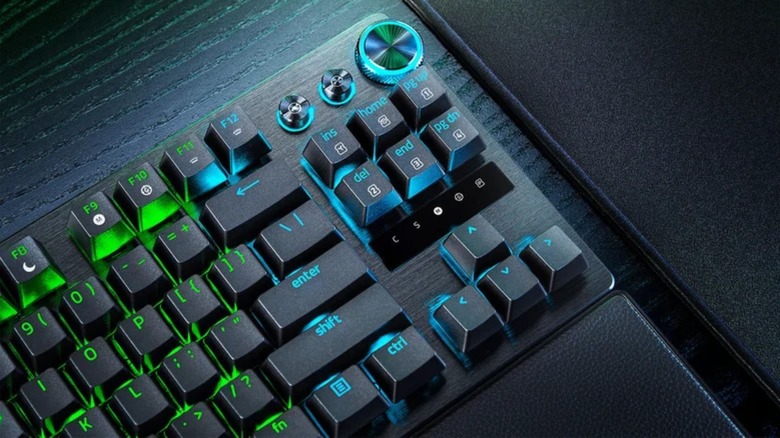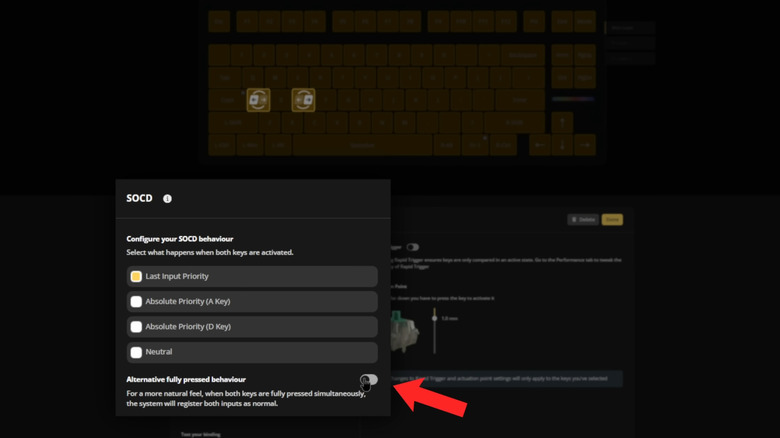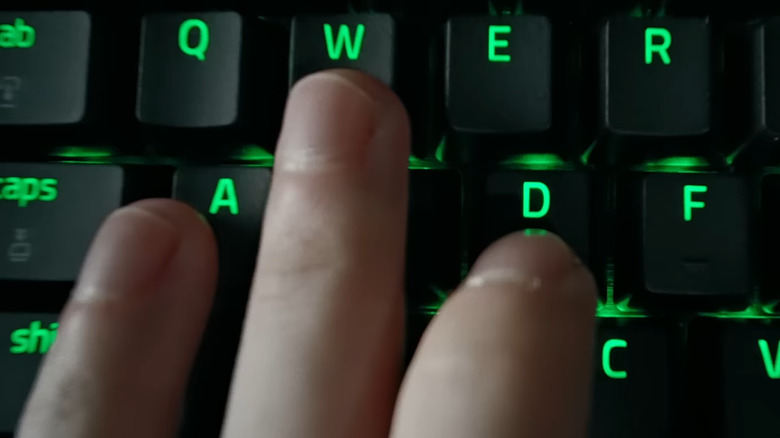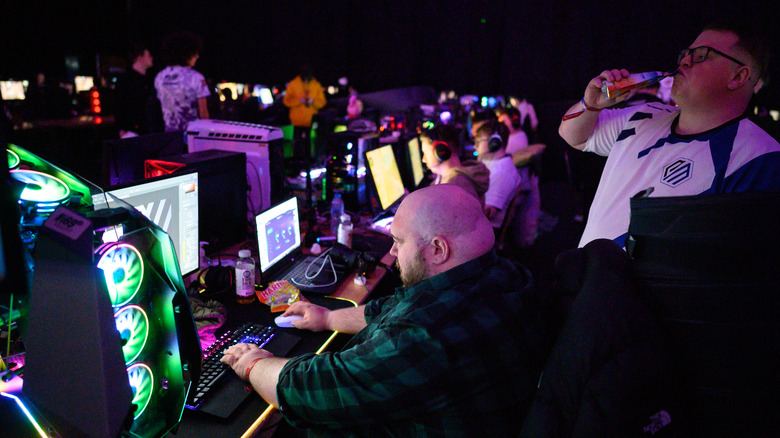What Is Razer Snap Tap? Why Some Gamers Think This Keyboard Is Cheating
The world of gaming is predicated on a delicate balance of trust. In games like "Overwatch 2," "Counter-Strike 2," and other competitive shooters, the most dedicated players use hard-won skills refined over thousands of hours of gameplay to eke out a win. Although things like computer specifications, specialized monitors, mice, and keyboards can give players an edge, it is assumed that all top players have access to the best PCs and gaming peripherals from a variety of brands. So, what happens when a new gaming keyboard introduces a feature that removes difficulty from gameplay and gives even casual players a true advantage over others? That's the question Razer answered when it released a new feature called Snap Tap, available now on its Huntsman V3 Pro gaming keyboard as well as other models.
Snap Tap solves a problem endemic to gaming with a mechanical keyboard. On other major brand keyboards, you must release a key before pressing a new one. This isn't an issue for tasks like writing, but in games, where moment-to-moment precision is life or death, input prioritization is much more consequential. For example, quickly moving left and right on a normal keyboard requires the A key to be released before the D key can trigger rightward movement. Snap Tap simply prioritizes the latest key to be pressed, ignoring any others that remain held down from prior inputs, and thus the D key can be pressed while the A key is still depressed. For some gamers, this is a step too far. While having a fancy keyboard isn't considered cheating, to have that keyboard doing extra work to improve your gameplay is something of a different beast. Some might argue that Snap Tap is corporate sanctioned cheating.
Snap Tap makes an important gaming skill obsolete
Snap Tap on the Razer Huntsman V3 Pro might not seem like a big deal at first. After all, why would it hurt to remove an obstacle that has annoyed mouse and keyboard gamers since time immemorial? The answer is related to a skill known as counter-strafing, in which players of competitive, movement heavy shooters like "Counter-Strike" rapidly move back and forth. This repetitive strafing both helps players to avoid being shot, and helps them shoot more accurately. "Counter-Strike" and some other shooters do not allow precision aiming when the player is in motion, so precise counter-strafing is necessary to keep an accurate aim. For these reasons, it is a skill the top players practice extensively to keep a competitive advantage. Snap Tap eliminates these concerns, allowing even a casual player to counter-strafe more effectively than some of the top players by holding down D and repeatedly tapping A.
Some players are up in arms over Snap Tap, labeling it a cheating device. However, there are two sides to the argument, and others feel that the feature will soon become standardized enough that any player who wants it will be able to purchase a keyboard that has a Snap Tap-esque input prioritization. Razer competitor Wooting has already implemented a nearly identical feature across all of its keyboards, which we'll discuss in a moment. The argument can be made that once these features catch on, anyone using a keyboard without them in games like "Counter-Strike" will be rendered as obsolete as a horse on a highway. YouTube personality Optimum, who first drew attention to Snap Tap, observed, "I think it's safe to say that gaming keyboards have changed forever."
Wooting joins Razer in toeing the line with gamers
Razer's release of the Snap Tap feature sent shock waves through the competitive gaming community, but it also raised the alarm for other gaming keyboard manufacturers. Now, Wooting is getting in on the action, and has released an identical feature it calls Simultaneous Opposing Cardinal Directions, or SOCD for short. Now, seemingly to compete with Razer, SOCD will combine with other controversial features to transform any player who can manage the basics of keyboard control into a movement god, dominating the battlefield.
Wooting had already been attempting to solve input prioritization on the hardware level. Mechanical keyboards use switches, spring-loaded mechanisms that activate a keypress when they reach an actuation point. Wooting's prior Rappy Snappy feature worked by observing two keys and prioritizing the one pressed down the furthest. In combination with its Hall switches, which have adjustable actuation points to make them quicker, this allowed for a similar effect, except unlike Snap Tap, it did not allow one key to be completely depressed.
In fact, Wooting's implementation of SOCD is slightly better than Razer's feature, at least on paper, as it allows for different resolutions and the option for both pressed keys to be active. It's clear that Razer opened Pandora's box with Snap Tap, and no matter how much some gamers believe these features amount to cheating, it won't be long before they're forced to either buy a keyboard that has a SOCD-style feature or fall behind their competitors who don't mind exchanging scruples for a higher spot on the leaderboard.
Snap Tap and Wooting SOCD are similar to a cheating technique
Gamers who see Razer Snap Tap and Wooting Rappy Snappy as cheating have one more argument up their sleeves, and a compelling one at that. For years, there has been a market for devices and computer scripts that insert themselves between input devices and gaming consoles or PCs to create artificial advantages. These devices and scripts are banned by a number of games and consoles. Even games like "Destiny 2" that do not have esports leagues have banned them – though for reasons other than counter-strafing. Players found to be deliberately cheating using certain methods can be banned for life.
One of the main uses for these cheating techniques is to create what's called a null bind, a line of script that does essentially the same thing as Snap Tap and SOCD, prioritizing the latest keypress. Such scripts are usually detectable because they require a middleman script or hardware device, but when implemented at the level of the keyboard itself, it is unclear whether games can be programmed to notice that essentially the same script is being run.
How will game studios respond to Razer and Wooting?
The remaining question — now that Snap Tap, SOCD, and similar features appear set to become mainstream — is how game developers will respond. Difficult as it is to detect keyboards with these features, will the companies behind competitive games make their use a bannable offense as some have done for null bind scripts and aimbots? Such a rule would hardly be enforceable outside of live tournaments unless anti-cheating software can somehow be updated to detect Snap Tap users.
On the other hand, allowing these keyboards to run roughshod over the meta of any given game could be disastrous, too, as casual gamers who aren't in the know will regularly find themselves outmatched by players who've effectively purchased their way to victory. A third solution might be to update movement and aiming systems in affected games, but to do so would change the fundamental feeling of gameplay that is intrinsic to that game's identity. It's a catch-22 without any clear solution in the short-term, and games may end up needing to reverse course on null bind bans so that those using budget friendly mechanical keyboards can maintain equal footing.
Snap Tap and SOCD have caused such a panic for some gamers that over on the Steam Community forums users are asking whether Valve will ban "Counter-Strike 2" players who use the Razer Huntsman V3 Pro or Wooting keyboards with SOCD enabled. Even major figures in the community are speaking out, with professional "Counter-Strike 2" player Ropz stating on X that Snap Tap shouldn't be allowed on the grounds that "it basically removes the human error part when you move/strafe." Optimum observed of both it and Wooting's SOCD, "These two keyboards are, like, the most 'pay to win' upgrades that you could ever own."




